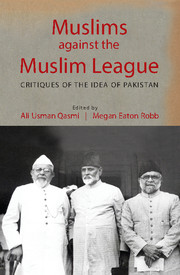Book contents
- Frontmatter
- Contents
- Acknowledgements
- Introduction
- 1 Maulana Husain Ahmad Madani and the Jami'at ‘Ulama-i- Hind: Against Pakistan, against the Muslim League
- 2 The Partition Conundrum: Perspectives, Experiences and Ambiguities from qasbahs in India
- 3 Choudhary Rahmat Ali and his Political Imagination: Pak Plan and the Continent of Dinia
- 4 Differentiating between Pakistan and Napak-istan: Maulana Abul Ala Maududi's Critique of the Muslim League and Muhammad Ali Jinnah
- 5 Advising the Army of Allah: Ashraf Ali Thanawi's Critique of the Muslim League
- 6 The Illusory Promise of Freedom: Mian Iftikhar-ud-Din and the Movement for Pakistan
- 7 Visionary of Another Politics: Inayatullah Khan ‘al-Mashriqi’ and Pakistan
- 8 Nonviolence, Pukhtunwali and Decolonization: Abdul Ghaffar Khan and the Khuda'i Khidmatgar Politics of Friendship
- 9 Islam, Communism and the Search for a Fiction
- 10 Muslim Nationalist or Nationalist Muslim? Allah Bakhsh Soomro and Muslim Politics in 1930s and 1940s Sindh
- 11 Dancing with the Enemy: Sikander Hayat Khan, Jinnah and the Vexed Question of ‘Pakistan’ in a Punjabi Unionist Context
- 12 Religion between Region and Nation: Rezaul Karim, Bengal, and Muslim Politics at the End of Empire
- 13 ‘The Pakistan that is going to be Sunnistan’: Indian Shi'a Responses to the Pakistan Movement
- 14 The Baluch Qaum of Kalat State: Challenging the Ideological and Territorial Boundaries of Pakistan
- Contributors
- Index
9 - Islam, Communism and the Search for a Fiction
Published online by Cambridge University Press: 28 February 2018
- Frontmatter
- Contents
- Acknowledgements
- Introduction
- 1 Maulana Husain Ahmad Madani and the Jami'at ‘Ulama-i- Hind: Against Pakistan, against the Muslim League
- 2 The Partition Conundrum: Perspectives, Experiences and Ambiguities from qasbahs in India
- 3 Choudhary Rahmat Ali and his Political Imagination: Pak Plan and the Continent of Dinia
- 4 Differentiating between Pakistan and Napak-istan: Maulana Abul Ala Maududi's Critique of the Muslim League and Muhammad Ali Jinnah
- 5 Advising the Army of Allah: Ashraf Ali Thanawi's Critique of the Muslim League
- 6 The Illusory Promise of Freedom: Mian Iftikhar-ud-Din and the Movement for Pakistan
- 7 Visionary of Another Politics: Inayatullah Khan ‘al-Mashriqi’ and Pakistan
- 8 Nonviolence, Pukhtunwali and Decolonization: Abdul Ghaffar Khan and the Khuda'i Khidmatgar Politics of Friendship
- 9 Islam, Communism and the Search for a Fiction
- 10 Muslim Nationalist or Nationalist Muslim? Allah Bakhsh Soomro and Muslim Politics in 1930s and 1940s Sindh
- 11 Dancing with the Enemy: Sikander Hayat Khan, Jinnah and the Vexed Question of ‘Pakistan’ in a Punjabi Unionist Context
- 12 Religion between Region and Nation: Rezaul Karim, Bengal, and Muslim Politics at the End of Empire
- 13 ‘The Pakistan that is going to be Sunnistan’: Indian Shi'a Responses to the Pakistan Movement
- 14 The Baluch Qaum of Kalat State: Challenging the Ideological and Territorial Boundaries of Pakistan
- Contributors
- Index
Summary
Political Islam and communism present us with a curious case of two global political ideologies that seem to follow each other like shadows, either equated as principal threats to liberal universalism or presented as fierce adversaries fighting to win political hegemony in the non European world. In colonial India, both traced their modern genesis from the same political event, the Khilafat/ Non- Cooperation movement (1919– 1922). In fact, the first Communist Party of India in Tashkent was established by partisans of pan- Islamism, symbolizing the intimate relationship between the two political currents during the anti - colonial movement.
In this essay, I engage with the writings of Shaukat Usmani, a forgotten figure of the Indian communist movement who was perhaps one of the best known communists outside Europe during the 1920s. His early life allows for a study of both the convergence and the splitting of political Islam and communism as he traversed both these ideological spectrums in the charged political atmosphere of the 1920s. Since Usmani quit active politics in 1932 (almost a decade before the idea of Pakistan entered popular imagination), I deal primarily with the shared ‘pre- history’ of political Islam and communism in India prior to the emergence of the Muslim League and the Communist Party of India (CPI) as major political entities in the sub continent. This intellectual history permits us to conduct a geneological investigation into the relationship between Islam and communism, to unearth both the subterranean connections and antagonisms between the two political ideologies. More importantly, my emphasis on the shared history between political Islam and communism aims to conceptualize the ‘problem’ posed by Muslim nationalism to the burgeoning communist movement (which moved between supporting and contesting the Muslim League, as detailed by Ali Raza in this volume), as well as for the Muslim League, which oscillated between strategic alliances with and declarations of treason against Muslims involved in the communist movement. In other words, my essay attempts to conceptualize the complicated relationship between political Islam and communism at the moment of their simultaneous birth, in order to shed light on the overlapping yet antagonistic trajectories of these political projects, with important consequences for the development of political thought in Pakistan.
- Type
- Chapter
- Information
- Muslims against the Muslim LeagueCritiques of the Idea of Pakistan, pp. 255 - 284Publisher: Cambridge University PressPrint publication year: 2017

